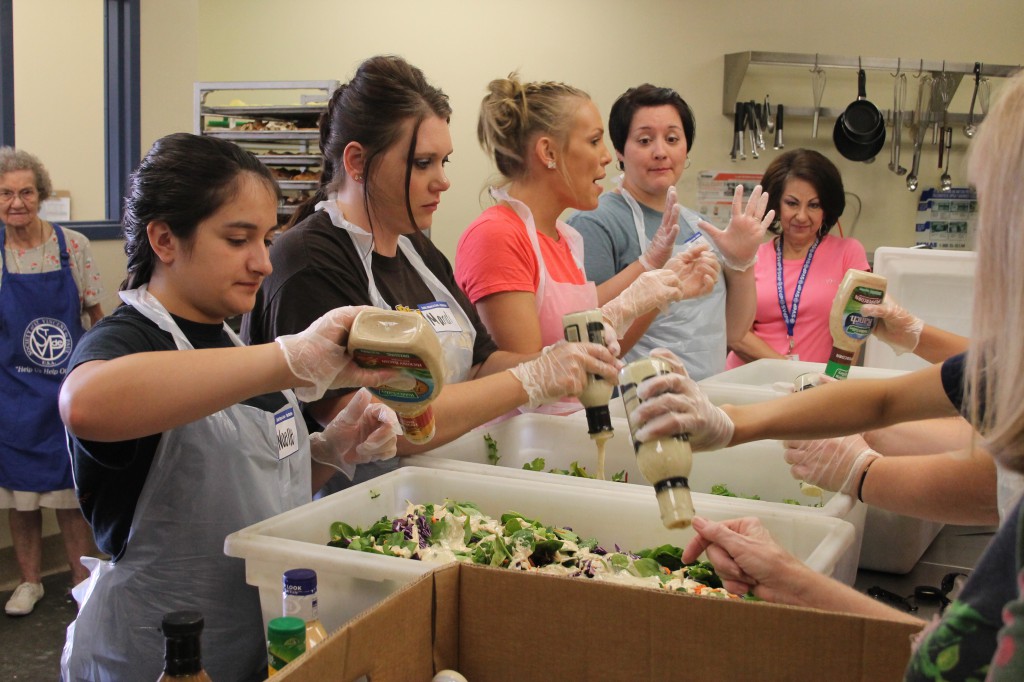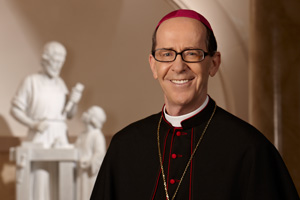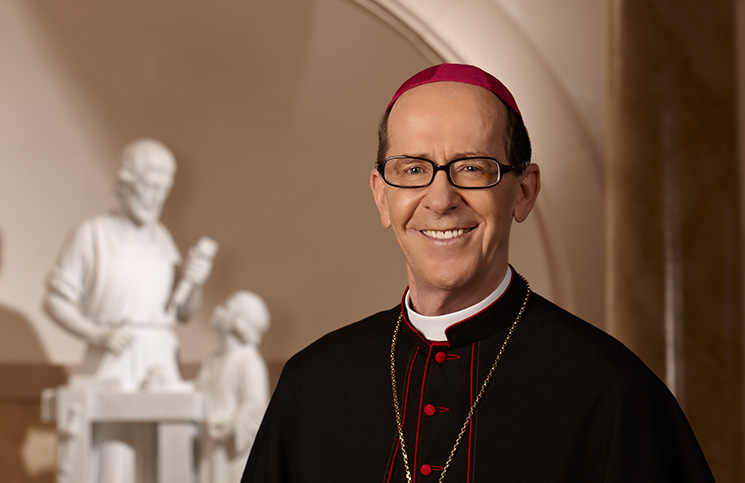
The following column is an adaptation of the homily given by Bishop Thomas J. Olmsted on June 24, 2014, at St. Mary’s Basilica in Phoenix. It was given on the solemn feast of St. John the Baptist, one of the great martyrs who remained faithful in the face of persecution by political power.
[dropcap]F[/dropcap]reedom is at the heart of Christianity. “By His obedience unto death,” the Catechism of the Catholic Church states (#908), “Christ communicated to His disciples the gift of royal freedom.”

Jesus sets us free from sin so that we can love, so that we can make a gift of self to others. To all who turn to Jesus in faith, He offers them the gift of freedom, so that they can rise above temptations to selfishness and gladly serve God and others. This is what St. John the Baptist did. It is also what happens day after day in the apostolates and ministries of our diocese.
There is a close connection between service of the poor, freedom and evangelization. Catholic apostolates integrate service to the poor with joyful witness to Christ; they serve because they love Jesus — not because they wish to proselytize. They freely receive God’s mercy; they freely give mercy to others in turn. They imitate Jesus in His solidarity with the poor.
Our charitable apostolates rejoice in the call of Pope Francis to go out to “the margins of society,” to be friends of the poor, to stand up for the rights of the most vulnerable, to restore hope to the hopeless.
Anyone who serves the poor receives more than he gives. For the poor have much to offer us, especially a joy with no connection to material things — the kind of joy found in St. John the Baptist, who before seeing the light of day “leaped for joy in his mother’s womb” when Jesus, also yet unborn, drew near.
To lift up the poor, John the Baptist teaches us, the joy of Christ must radiate from within us, and not be hindered by any sense of superiority. Notice how the Baptist does everything to point to Jesus: “Behold, One is coming after me; I am not worthy to unfasten the sandals of His feet” (Acts 13:25).
But to serve the poor we need freedom and we need religious liberty. Living in a world scarred by Original Sin, our freedom is always “limited and fallible” (Catechism, 1739). All too easily we can reject God’s plan of love, alienate ourselves from Him and from others, and be weighed down by spiritual oppression. John the Baptist, knowing well this fatal tendency, dedicated his entire life to preparing the way for the One alone who liberates us from slavery to sin and blesses us with the freedom of being children of God.
Every day, John’s deepest desire was simply this: “Jesus must increase, I must decrease.” That is freedom at its best, freedom at the service of God and others. That is why we honor John with joyful celebration today, and why we want to follow his example.
Religious liberty also has a precarious nature. Many of the first immigrants to America came to these shores to escape religious persecution in Europe. They came with fresh memories of martyrs for the faith like the British saints, Thomas More and John Fisher. This is why our nation’s founding fathers insisted that religious liberty needed to be enshrined as a first principle in our Constitution.
So it was that over 200 years ago, America became one of the first nations to enshrine this principle in its founding documents, and to put it at the top of the Bill of Rights. To a lesser extent than in John the Baptist’s day, to be sure, but nonetheless in a real way, religious liberty is now under threat both in America and abroad. In recent years, the Pew Research Center, a non-partisan agency, has published three comprehensive reports on social hostilities toward religion in all nations of the world. Between 2006 and 2010, it reports, religious liberty deteriorated every year. In 2010, 75 percent of the world’s population lived in countries where religious freedom was rated as “highly restricted” or “very highly restricted.” The problem, sadly, is worsening at an alarming rate, as is evident by the many refugees fleeing countries like Syria and Iraq, a number of whom are coming to Arizona; and we gladly welcome them.
What do the Pew Center reports say about the United States? In its first two reports, our restrictions on religion were rated as “low” and hostilities towards religions in America were graded as “moderate.” But, by 2010, when the third Pew report was released, religious hostility in the United States was ranked worse than China and Syria.
The decline in religious liberty in America is especially bad news for the poor. Why? Because it penalizes people of faith who, in large numbers, serve the poor, hampering or outright denying them the right to serve. For example, the U.S. Department of Health and Human Services mandate coerces religious believers to act against our most deeply held beliefs. This coercive government mandate, if it were to be upheld in our courts, would gravely harm the poor as it handcuffs those who serve them. It would force faith-based charities to pay steep fines, reducing their ability to serve, or to stop altogether their service.
So, while I give thanks to God for all of our charitable apostolates in the Diocese of Phoenix, I also make the words of Pope Francis my own, where he says: “In the context of society, there is only one thing which the Church quite clearly demands: the freedom to proclaim the Gospel in its entirety, even when it runs counter to the world, even when it goes against the tide.”
Every time that we salute our flag, we pledge allegiance to “One Nation under God… with liberty and justice for all.” Let us also pledge never to stop fighting for the right and the liberty to serve.







